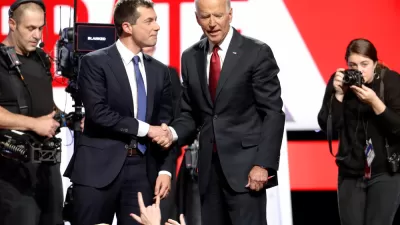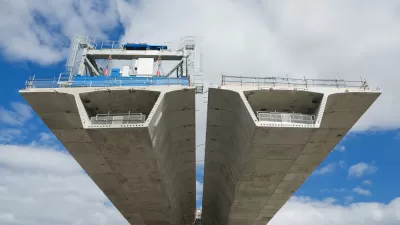The Trump Administration signaled a desire to scrap a funding program that helped fund transit, pedestrian, and bike infrastructure. A new program likely focused on rural and toll roads could take its place.

Update 1/3: Streetsblog USA is reporting that Secretary Elaine Chao did not announce that the Department of Transportation would cut the TIGER program. Further updates coming.
Update 2/3: a tweet by Yonah Freemark indicates that reports of the TIGER grant program's demise are premature. The Trump Administration draft budget proposal would cut the TIGER grant program, but the program can still be funded during the appropriations process.
As with many fed transport programs, the admin budget proposes cutting it, but if congress keeps appropriating funds, it will continue. Same with New Starts.
— Yonah Freemark (@yfreemark) March 7, 2018
Update 3/3: Streetsblog USA has posted a correction to the post reported below. According to the correction post, the error is in a misreading of Secretary Chao's remarks.
Original Post:
Angie Schmitt reports: "one year into the Trump administration, TIGER is officially on the way out."
U.S. Department of Transportation Secretary Elaine Chao told a House Transportation and Infrastructure Committee this week that the next round of TIGER grants would be the last. The Trump Administration is killing the program despite its popularity with congressional representation on both sides of the aisle.
Funding previously devoted to TIGER grants will now be switched to the new INFRA grant program. Schmitt explains what's known so far about INFRA:
The “INFRA” grant program is new, and it’s hard to know exactly what Trump’s DOT intends to do with it. Early signs point to a program that emphasizes rural projects and toll road construction, however. The program description on the U.S. DOT website starts off saying it will “address critical issues facing our nation’s highways and bridges highways and bridges” and never mentions walking, biking, or transit. It’s also replete with jargon about private-public partnerships and “leveraging capital.”
The article includes background on the TIGER grant program and the incremental evolution it represented for federal transportation funding, as well as some early speculation on the kind of grant-funded projects that will result from the new INFRA approach.
FULL STORY: The Trump DOT Is Killing the TIGER Program

Maui's Vacation Rental Debate Turns Ugly
Verbal attacks, misinformation campaigns and fistfights plague a high-stakes debate to convert thousands of vacation rentals into long-term housing.

Planetizen Federal Action Tracker
A weekly monitor of how Trump’s orders and actions are impacting planners and planning in America.

In Urban Planning, AI Prompting Could be the New Design Thinking
Creativity has long been key to great urban design. What if we see AI as our new creative partner?

King County Supportive Housing Program Offers Hope for Unhoused Residents
The county is taking a ‘Housing First’ approach that prioritizes getting people into housing, then offering wraparound supportive services.

Researchers Use AI to Get Clearer Picture of US Housing
Analysts are using artificial intelligence to supercharge their research by allowing them to comb through data faster. Though these AI tools can be error prone, they save time and housing researchers are optimistic about the future.

Making Shared Micromobility More Inclusive
Cities and shared mobility system operators can do more to include people with disabilities in planning and operations, per a new report.
Urban Design for Planners 1: Software Tools
This six-course series explores essential urban design concepts using open source software and equips planners with the tools they need to participate fully in the urban design process.
Planning for Universal Design
Learn the tools for implementing Universal Design in planning regulations.
planning NEXT
Appalachian Highlands Housing Partners
Mpact (founded as Rail~Volution)
City of Camden Redevelopment Agency
City of Astoria
City of Portland
City of Laramie





























